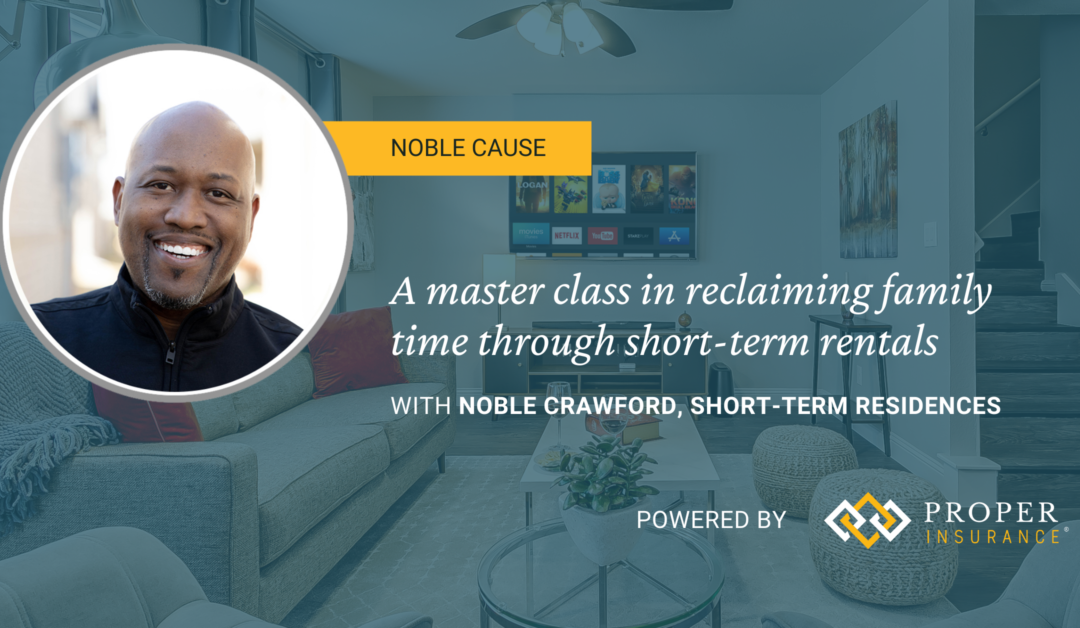In 2008, Noble Crawford’s wife, Elkie, was diagnosed with a brain tumor requiring surgery. Post-operation, the doctors gave her morphine to manage the pain. What no one knew was that Elkie had an undiagnosed allergy to morphine. The medication shut down her organs and caused her to flatline.
Thankfully, the ICU team was able to resuscitate her, but she still had a long road to recovery. So, Noble took a couple of months off from his job selling commercial audio-visual products to care for her.
Catalyst for change
“Nearing the end of that timeframe, I was called in for a company-wide sales meeting, and the CEO of the company at that time just berated me for my dismal sales numbers for the previous two months,” Noble recounted. “Needless to say, it was hard to absorb because everyone knew the situation that I was going through with my wife including him.
“I made a decision right then and there that I was not going to be in a position anymore in which I did not have my own time to take care of my family because I’m working for someone else. And so basically, I put my head down, went to work, and within a couple of years I landed a couple of big deals that allowed me to exit and cash out.”
With the seed money from his sales deals, he founded a marketing agency, which he operated for three years and then gradually handed over to his son to manage. The agency was successful monetarily but ended up consuming more of his time than his previous job. Hence, the search for an entrepreneurial venture that gave him more time with his loved ones resumed.

Moment of opportunity in the short term rental business
In 2013, he stumbled upon a video about short-term rentals online. His curiosity led him and Elkie to attend a meetup event in California to learn more about the business. More specifically, the event focused on the arbitrage business model – the practice of inking long-term leases on apartments in multifamily buildings and then renting out the units as short-term rentals.
“My wife and I looked at each other and said, we can do this back home in Texas,” he said. “When we got back, we went to work, and the rest is history.”
That’s not to say that Noble and Elkie didn’t have a lot of hard work and hurdles ahead of them. It took about a year to find a property management company or owner that would sign a lease with them because they were new to the space. With persistence, they found a smaller multifamily building whose owner was willing to work directly with them and leased their first units in 2014.
Since then, they have signed on and are currently operating 38 units through their company, Short-Term Residences, which offers both corporate housing and destination accommodations. They manage them with the help of a team of 11 contractors, virtual assistants and service providers.
A couple of months ago, Short-Term Residences also expanded its services to offer cars to their guests through the Turo app following a shortage of rental vehicles during the Covid-19 pandemic.
More time with family
In less than a year, the time that Noble and Elkie needed to spend on hosting tasks began to decrease, freeing them up to spend more time with each other and their family. By comparison, when he had been operating the marketing firm, he had worked an average of 12 hours a day, sometimes more.
“We found out in short order with short-term rentals that we could literally run our business in an hour a day or less in many cases once we understood what the systems were that we needed to have in place,” Noble said.
Meanwhile, Elkie was able to leave her full-time job as a school secretary. Her health has vastly improved, but she still experiences the repercussions of her brain tumor, including a permanent loss of her sense of taste and smell. She said she treasures the extra time she now has to spend with her family.
“Before, we didn’t have much time, and we would miss certain things,” she said. “Now it gives us the freedom to have more time to do family things.”
She said she has especially savored the extra time she had to go to her kids’ curricular activities and the flexibility of being able to travel. Since the couple started hosting, the family has visited Hawaii, Madrid, St. Lucia in the Caribbean, Mexico, and other destinations.
Paying it forward through education
With the time freed up by Short-Term Residences, Noble became more active in educating and mentoring others, something that’s always been important to him. For years, he and Elkie had been sharing their knowledge about how to get started in short-term rentals with friends and people they met.
So, in 2019, he started the Hospitality Cashflow podcast to pick the brains of other industry players, promote networking, and educate others on innovative and best practices. The podcast, co-hosted by real estate investor Matt Anices, started out with information on arbitrage model but has since expanded to a broader audience in the short-term rental space and bringing in subject matter experts.
For instance, Noble interviewed Proper Insurance and TJ Tijani of Short-Term Rental Roadmap in February for an episode on how to responsibly insure short-term rentals. Noble and Elkie use Proper Insurance for their own properties.
“Proper is the biggest player in the space, they have the most comprehensive coverage,” Noble said. “They offer things that so many other providers do not offer. For example, bed bug coverage is hard to get outside of Proper.”
FAQs: Do you need short-term rental insurance
The company also offers business loss insurance. One problem for STRs is property damage, often the result of parties or rowdy guests. As a result, hosts may be forced to shut down a rental for repairs, which could take weeks or even months. If you have to cancel incoming guests because of that, Proper will cover loss of income during the period of restoration.
Noble’s educational reach expanded last year with the launch of the viral hospitality platform Clubhouse. The invitation-only audio application allows “clubs” to host discussions on hospitality themes in different “rooms.” Hospitality Cashflow’s club has over 5,000 members.
The application has drawn operators, property owners, property managers, landlords, land developers, and newcomers who are interested in entering the industry and put them in the same virtual room together. The applications have increased connections in the industry exponentially, but the benefits are priceless for short-term rental novices.
“People with no experience are getting $10,000 worth of information for free essentially by moderators that are willing to share that through the app as they talk about these different topics in these rooms,” he said.
Responsible renting – how to start a short term rental
Last year, Noble also began offering one-on-one and group coaching sessions on starting a short-term rental business. Earlier this month, he and some partners founded The Academy, where Noble offers classes on short-term rentals to beginners who can’t afford the private or group coaching.
2022 Report: State of the Short-Term Rental Community
But it’s not enough to draw insight from the experts. New short-term rental entrepreneurs also need to do their own research, Noble said.
He assigns students homework to research the laws on short-term rentals in their locality to ensure their plans work and comply with regulations.
“It’s so important being responsible operators,” Noble said. “Operating your business in a way that is both legal and ethical is paramount to the success of this industry.”
•••
This article is a part of our Forward Thinkers series powered by Proper Insurance
Proper Insurance leads the nation in short-term rental insurance, with over 100,000 policies written in all 50 states. Their policy covers vacation homes, townhouses, condos, duplexes, cabins, cottages, apartments and more. With expert vacation rental underwriters, they can tailor a policy specific to your short-term rental property.



